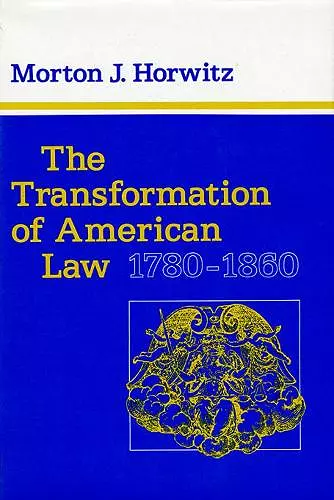The Transformation of American Law, 1780–1860
Format:Paperback
Publisher:Harvard University Press
Published:30th May '79
Currently unavailable, and unfortunately no date known when it will be back

One of the five most significant books ever published in the field of American legal history. -- William E. Nelson, Yale University
In a remarkable book based on prodigious research, Horwitz offers a sweeping overview of the emergence of a national legal system from English and colonial antecedents. He treats the evolution of common law as intellectual history and demonstrates how shifting views of private law became a dynamic element in the economic growth of the U.S.
In a remarkable book based on prodigious research, Morton J. Horwitz offers a sweeping overview of the emergence of a national (and modern) legal system from English and colonial antecedents. He treats the evolution of the common law as intellectual history and also demonstrates how the shifting views of private law became a dynamic element in the economic growth of the United States.
Horwitz's subtle and sophisticated explanation of societal change begins with the common law, which was intended to provide justice for all. The great breakpoint came after 1790 when the law was slowly transformed to favor economic growth and development. The courts spurred economic competition instead of circumscribing it. This new instrumental law flourished as the legal profession and the mercantile elite forged a mutually beneficial alliance to gain wealth and power.
The evolving law of the early republic interacted with political philosophy, Horwitz shows. The doctrine of laissez-faire, long considered the cloak for competition, is here seen as a shield for the newly rich. By the 1840s the overarching reach of the doctrine prevented further distribution of wealth and protected entrenched classes by disallowing the courts very much power to intervene in economic life.
This searching interpretation, which connects law and the courts to the real world, will engage historians in a new debate. For to view the law as an engine of vast economic transformation is to challenge in a stunning way previous interpretations of the eras of revolution and reform.
He has read widely in many fields...[and] has gathered a rich harvest for any reader...a remarkable achievement. * Yale Law Journal *
It is to be hoped that a wide audience will read it since the issues it raises are indispensable...Horwitz's book is written with a passion. * New York Review of Books *
A thoughtful contribution to the continuing issue of whether and how much we are governed by our judges. * Library Journal *
One of the five most significant books ever published in the field of American legal history. -- William E. Nelson, Yale University
- Winner of Thomas J. Wilson Prize 1976 (United States)
ISBN: 9780674903715
Dimensions: 235mm x 156mm x 25mm
Weight: 635g
384 pages